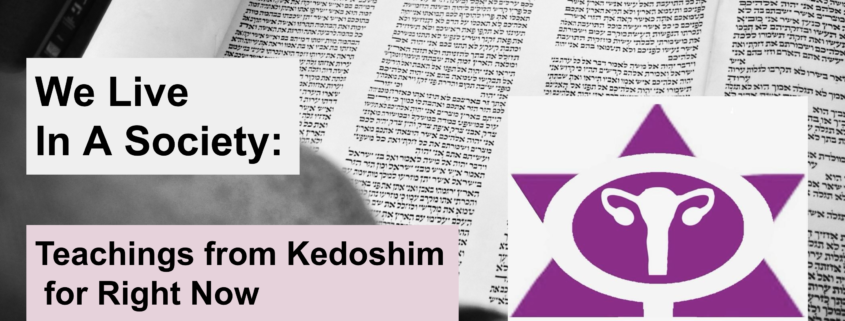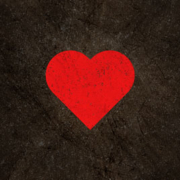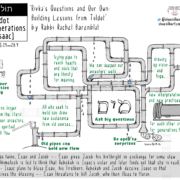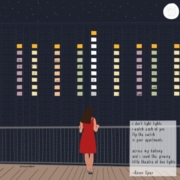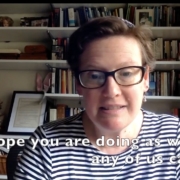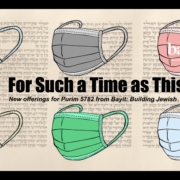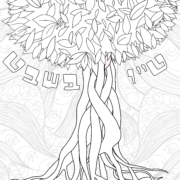We Live in a Society: Teachings from Kedoshim for Right Now
My son and I often say, “We live in a society.” For us it’s shorthand, a reminder about community. We need to be mindful of people’s needs, because we live in a society. If a kid is being bullied, stand up for them, because we live in a society. If a neighbor needs help carrying in the groceries, offer to help, because we live in a society. We have obligations to each other, because we live in a society.
Enter this week’s Torah portion, Kedoshim. קְדֹשִׁ֣ים תִּהְי֑וּ / Kedoshim tihiyu: “y’all shall be holy, for I your God am holy!” The imperative is in the plural. Y’all be holy now! This isn’t about individual righteous behavior. Because — say it with me now — we live in a society. So what does it mean to be kedoshim, to be holy as a community? Here are some of Torah’s answers in this week’s parsha:
These verses are so important that we hear them twice a year: in our cycle of regular Torah readings, and again on the afternoon of Yom Kippur. On that holiest day of the year, Torah reminds us: a righteous society is one that centers the needs of the vulnerable. In a righteous society, we take pains to ensure justice. And we must not stand idly by when others are harmed.
Earlier this week the news broke that the Supreme Court is likely to strike down Roe v. Wade. This isn’t a surprise, but it still feels shocking to recognize that the right to bodily autonomy can be taken away. Here in Massachusetts that right is protected, but there are 26 states where that right will disappear as soon as Roe falls. In half of this country, half of the people will lose a right.
Jewish tradition not only permits but even mandates abortion when the pregnant person’s life is at risk. Until a fetus is born and draws breath, the life of the pregnant person is paramount. This is a mainstream understanding of Jewish law, expressed by rabbis ranging from Reform to Conservative to Orthodox. What SCOTUS seems poised to do violates our religious freedom.
What SCOTUS is poised to do will cause unimaginable harm. It is horrific to think of being forced to bear a child. In many states, abortion will become illegal even in cases of (God forbid) rape or incest. These are ugly words. It pains me to say them. But this is real, and we need to face it, because people are going to suffer. I don’t know how best to help them. But we need to try.
Talmud teaches kol Yisrael arevim zeh bazeh, all of Israel is responsible for one another. Phrased more universally, we are all responsible for one other. Living in a society means there are things we owe to each other. As Jews, we especially have an obligation to those who are most vulnerable. Torah tells us repeatedly to care for the widow, the orphan, the stranger: those most at risk.
As the National Council of Jewish Women reminds us:
I am not a legal scholar by any stretch, but reputable voices have argued that if the Supreme Court nullifies the fundamental right to privacy that underpins Roe v. Wade, other decisions that hinge on that right may also be at risk. I keep coming back to words from the writer Roxane Gay: “Any civil right contingent upon political whims is not actually a civil right.”
I’ve spoken with many of you this week who are profoundly shaken by what’s unfolding. I hear and I honor your grief and anxiety, anger and fear. We may be poised to lose many of the last century’s advances. It’s important to give ourselves space to feel what we’re feeling. And then we need to channel our feelings into action, to help those who will be most at-risk in days to come.
The work of justice is long. If the Supreme Court takes away rights that we now enjoy, then we will work toward a world in which those rights are restored. As we read in Pirkei Avot (which I’ve been studying with our b-mitzvah students), “It is not incumbent on us to finish the work, but neither are we free to refrain from beginning it.” As Torah teaches, do not stand idly by.
A couple of verses after the one about not standing idly by, we reach the verse we’ve been singing all morning: וְאָֽהַבְתָּ֥ לְרֵעֲךָ֖ כָּמ֑וֹךָ / “Love your fellow human being as yourself.” Rabbi Akiva called this vderse clal gadol, “a great principle,” or possibly “The great principle” of Torah. It’s at the heart of Torah — metaphorically, per Akiva, and also pretty much literally in the very middle.
Cornel West wrote, “Justice is what love looks like in public.” The way we love our fellow human beings is by working toward justice. God, give us the strength to stand up for those who are most at risk. Give us the strength to not stand idly by. Give us the strength to build a world of greater justice for everyone, because that is how we live out the commandment to love.
And let us say: amen.
This d’var Torah by R. Rachel Barenblat was offered at Shabbat morning services at Congregation Beth Israel of the Berkshires, cross-posted to Velveteen Rabbi and to the From the Rabbi blog on the synagogue website.

